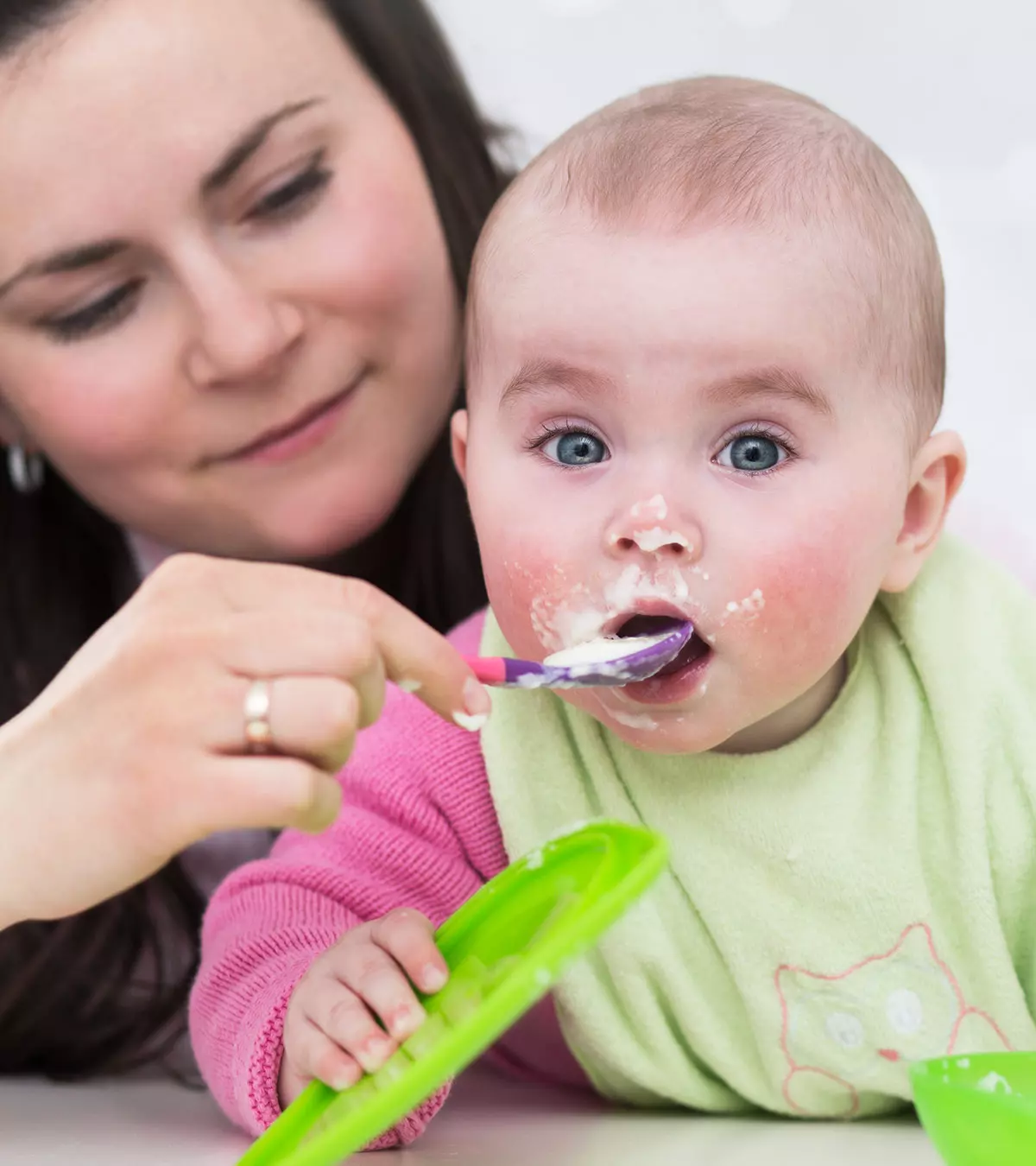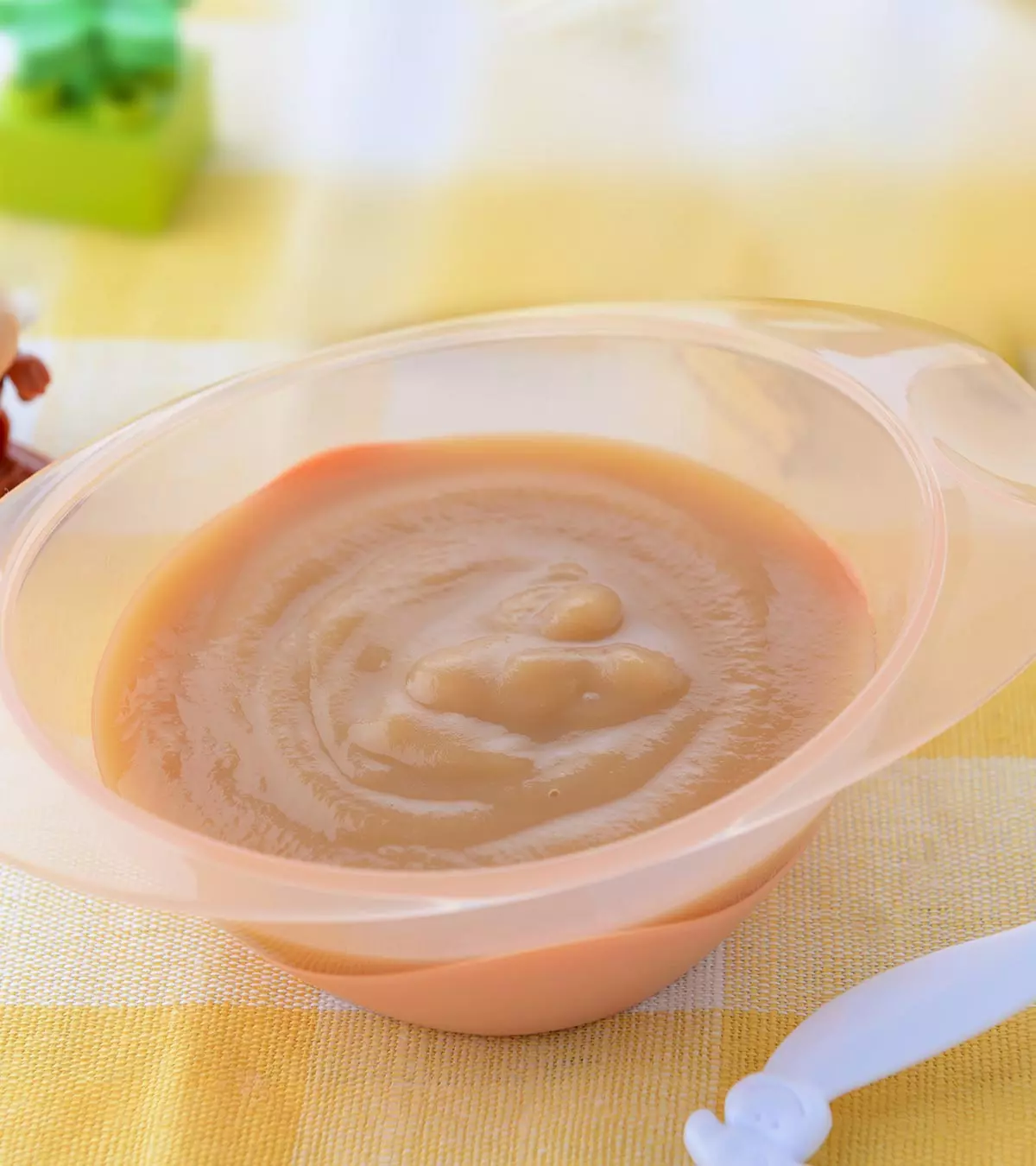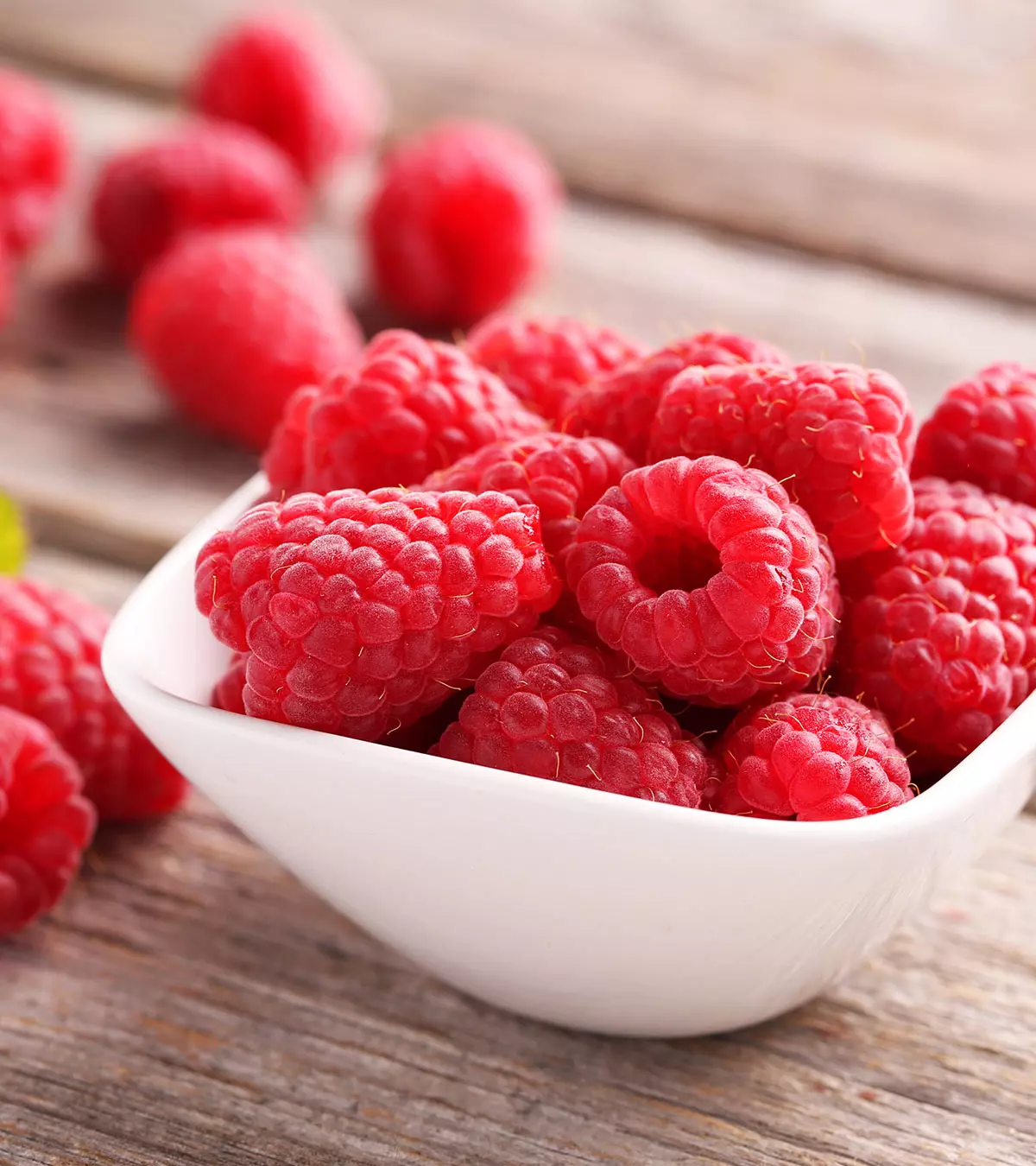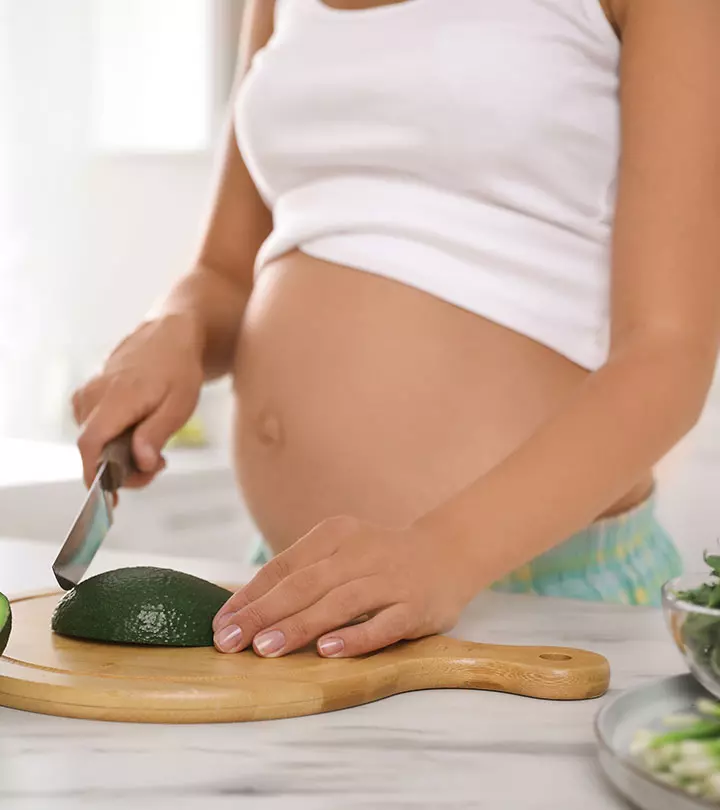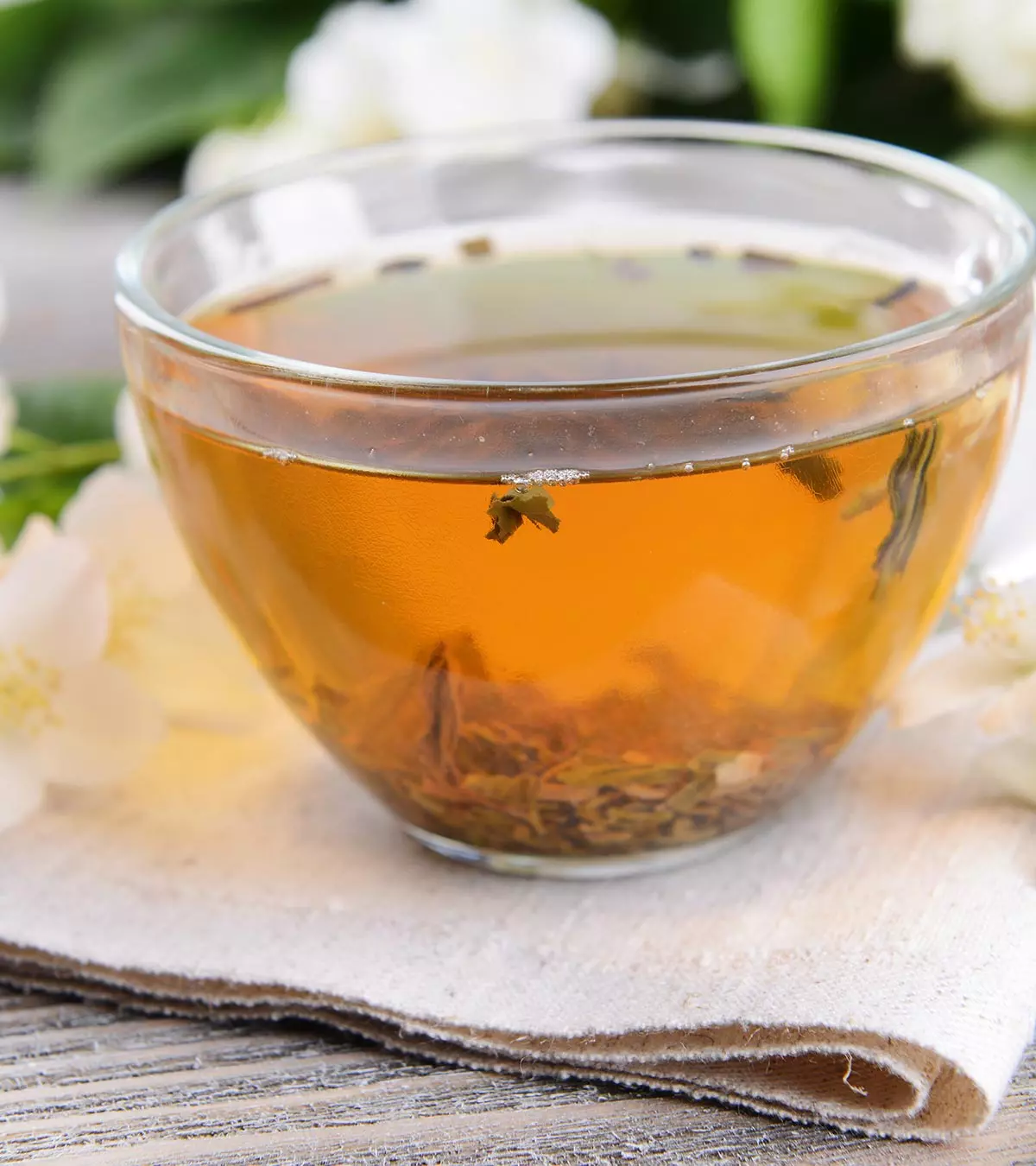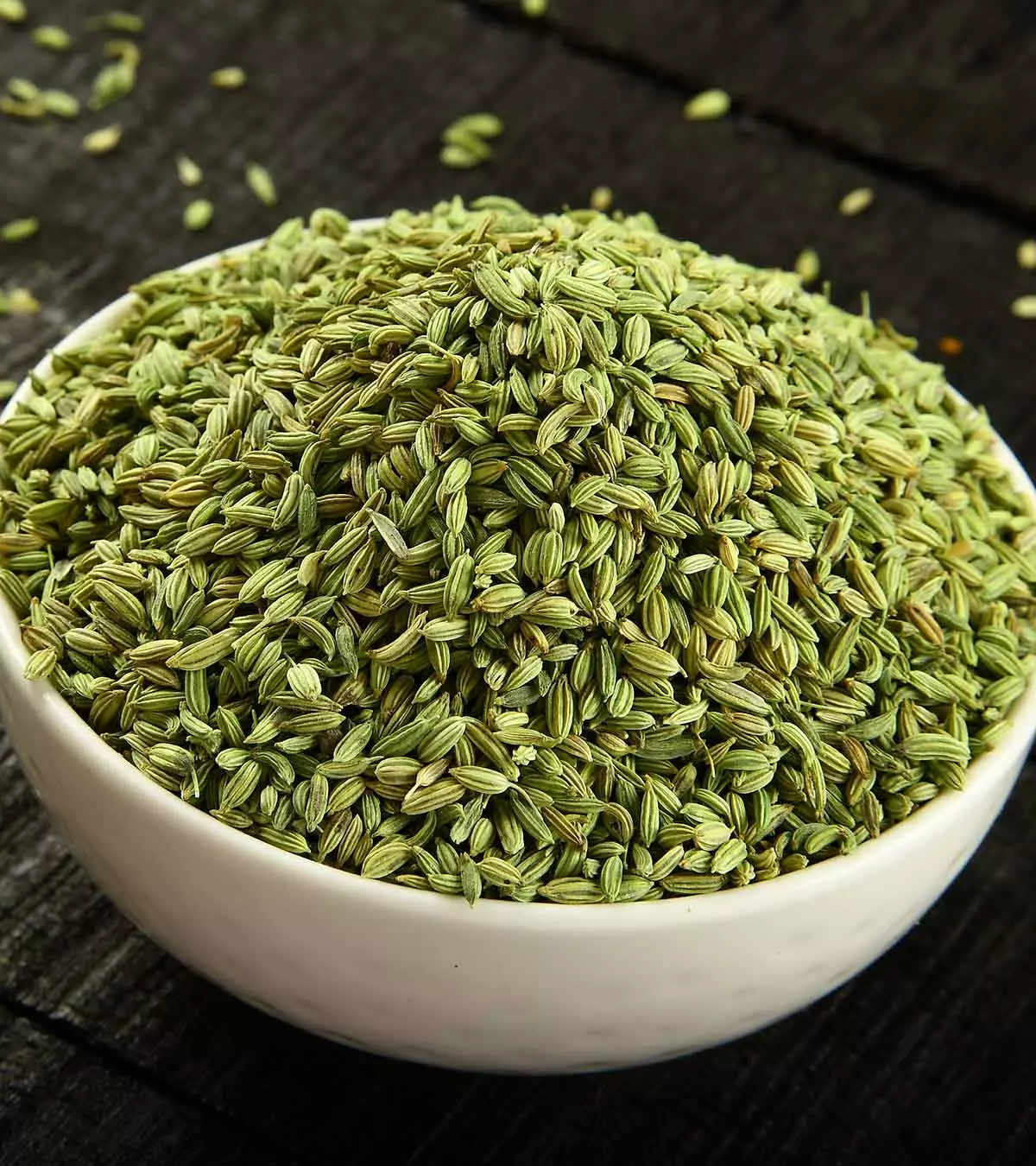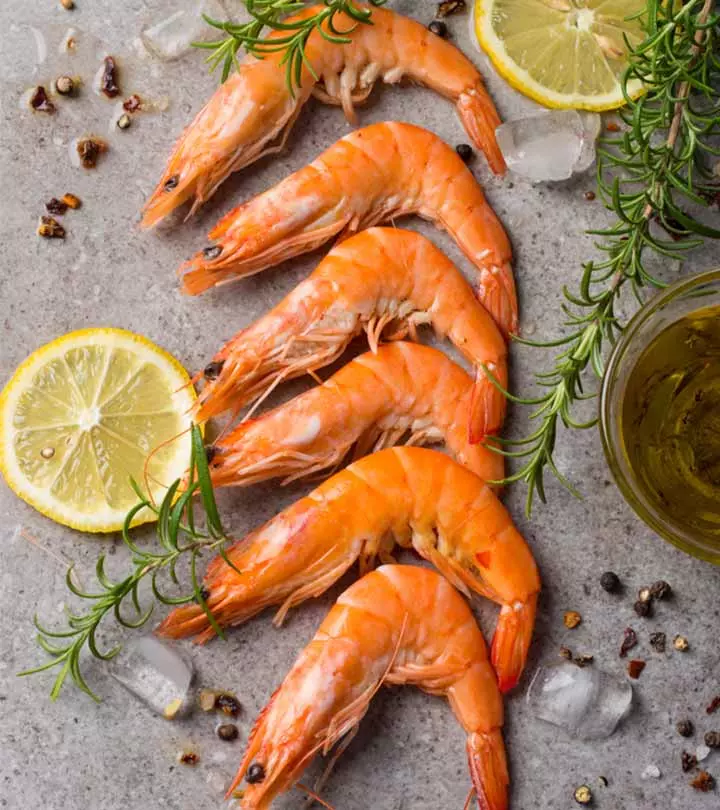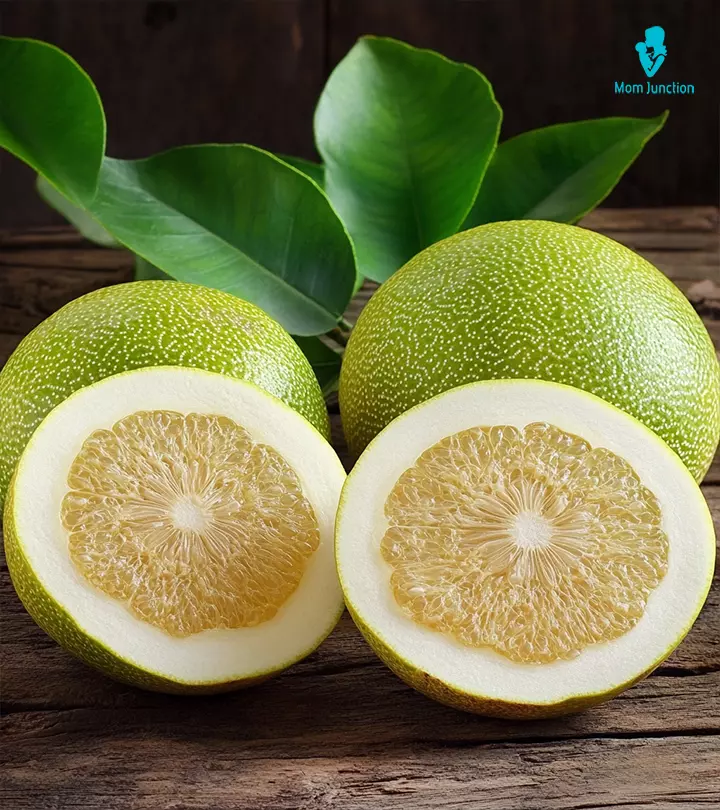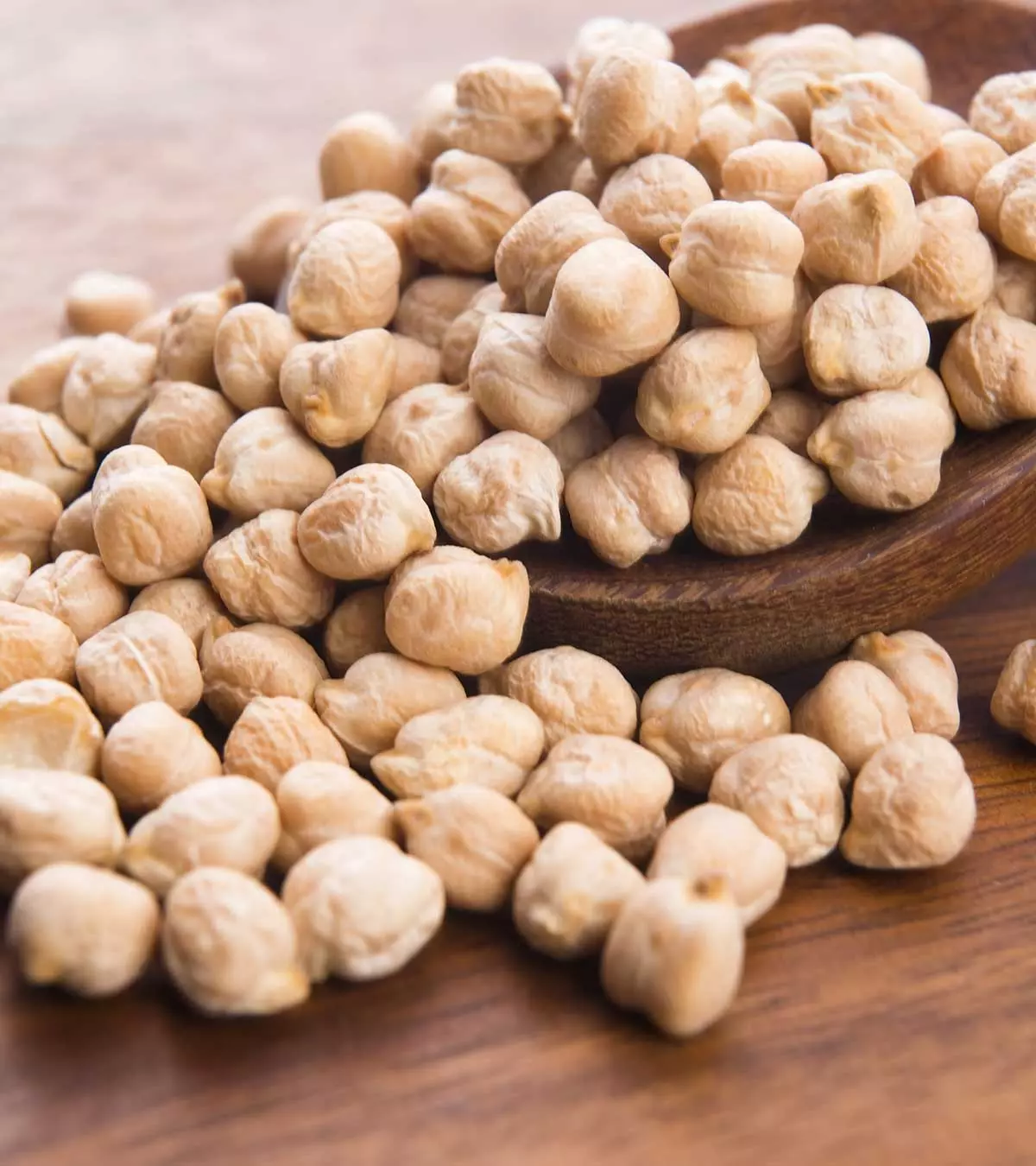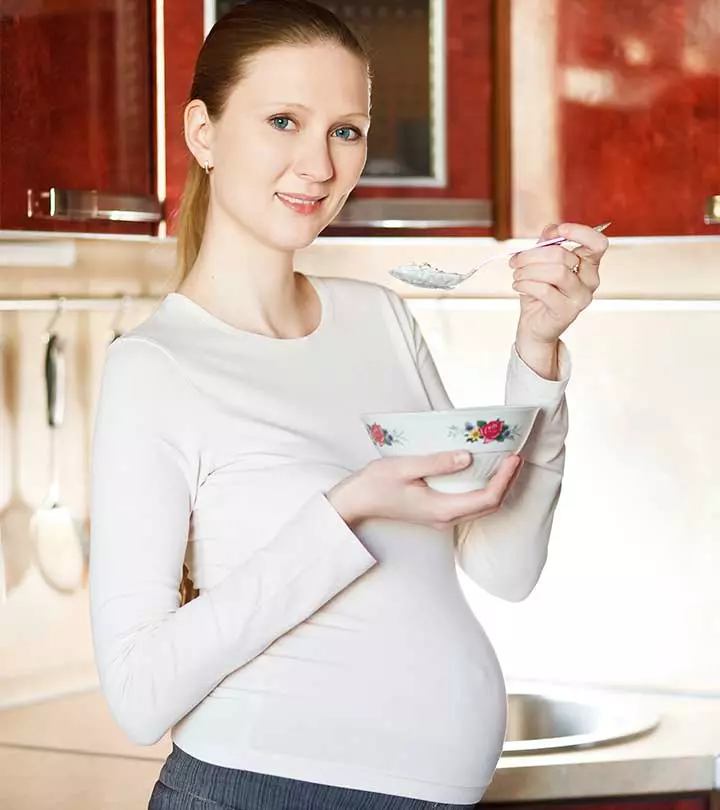
Image: ShutterStock
If you have an eight-month-old at home, here’s everything you need to know about 8th-month baby food and recipes. Planning nutritious meals for your child is important because as babies grow, their activities increase, and so does their energy requirement. Offering several food options is necessary for infant nutrition, as a diverse food makes their regular diet complete. If you are not sure how to add variation to your baby’s food, we have compiled a list of food items and recipes that are easy to prepare and will be loved by your child. It also gives you some information on the amount of milk your baby needs at this age and how you can create an effective diet plan for them. So, read on to know more.
Key Pointers
- It is crucial to offer a variety of food items for your baby to explore.
- Include lentils, rice, fruits, vegetables, eggs, fish, meat, and cheese to suit the baby’s growing nutritional needs.
- Offer the baby a range of foods, but ensure that they are not allergic to any food item before offering it to them.
Best Foods For 8-Month-Old Baby
You may have read up a lot about the foods to give your baby this month. Introducing new foods to your baby is an essential part of weaning. We know, there is so much information out there that it overwhelms you and leaves you confused. This is precisely why we have compiled the most suitable foods that you can feed your baby in the eighth month.
1. Breast milk or formula
Breast milk:
Continue offering breast milk to your baby as she is still growing. Breast milk should be her prime source of nutrition. Try to give solid foods as an add on.
It is advised by the American Academy of Pediatrics (AAP) to continue breastfeeding a baby exclusively for six months and alongside the introduction of complementary foods, for up to 12 months of age.
Your baby needs more breast milk in the first six months. But after that his requirement for breast milk comes down as you begin giving him solid foods (1). The standard range of milk intake by a breastfed baby is 19-30 oz per day (570-900ml).
According to the US Centers for Disease Control and Prevention (CDC) breastfeeding report card 2022, 55.8% of babies receive any breast milk, and 24.9% are exclusively breastfed at six months. However, these numbers gradually decline as 42.5% of babies receive any breastfeeding at nine months, and by 12 months, the rate drops to 35.9%.
How much expressed milk is needed for an eight-month-old?
Estimate the number of times your baby drinks milk each day, for instance five times. Divide 25oz by the number (25/5 = 5oz). In this case, you need to express 5oz for each feed. However, do not force the little one to finish the bottle as she may not have the appetite after eating some solids.
Infant Formula: Infant formula or baby milk powder is designed to provide the same advantages as that of breast milk. Mix it in a cup and feed it to your baby as a meal. If your baby refuses a cup, then try a feeding bottle.
What if your eight-month-old drinks more milk than required?
Ideally, you need to reduce the amount of milk to accommodate solid foods. However, if she is drinking more than the average quantity of milk, try to find the reasons behind it:
- Fast flow bottles can make the baby drink more than the required amount of milk. Use low-flow bottles. Make sure that you are measuring the amount of milk that you are giving her for each feed.
- The strong urge to suck while breastfeeding, can make your baby drink more. Prevent this by giving him a pacifieriAn object with a nipple designed for a young child to suck .
Estelle Link, a mother of two, writes in her blog about how she learned that a child may not just feed for hunger but may also suckle for comfort. She says, “Once at home, my firstborn spent 22 hours a day fixed to my breasts. He didn’t want to let go and looked afterward to still be hungry (he pulled out his tongue and moved his head from side to side, which are clear signs of hunger). That was the beginning of a lesson for me to remember. Learn the difference between drinking and sucking for comfort.” She adds, “If your loved one still feels the need to suck for comfort, don’t hesitate to give a pacifier. It helps so much in defining the meal times and avoiding one day-long meal, which can easily lead to frustration and exhaustion. The next time your baby will be hungry, he should drink himself full in a shorter time (i).”
Note: At this age, your baby needs 750 and 900 calories a day. Breast milk or formula should contribute to at least 400 to 500 calories.
2. Pulses, wheat and rice
As their appetite changes, Feed your eight-month baby with cooked, non-spicy lentils. Offer freshly baked and soft chapathi (wheat bread). Avoid multi-grain bread.
3. Cereal
To offer your baby iron-rich foods, Feed cereals rich in iron content such as oats, ragi, barley, etc. Nutrients present in fortified cereals are not present in usual baby foods such as bread and veggies
4. Fruits
Mash them well, without lumps, and feed them to your eight-month-old. Choose from bananas, apples, avocados, pears, strawberries, cherries, peaches, and more. Almonds, peanuts, and other nuts are also a good addition to your baby food, but make sure to introduce them as powders or paste added to purees to prevent choking.
5. Vegetables
Offer well-cooked and steamed foods to your baby. Cut them into small pieces to avoid choking hazard and for easy chewing. Some of the best vegetables for babies aged below one year are potatoes, cauliflower, beans, peas, and sweet potatoes. They serve as great finger foods for 8-month-olds.
 Quick tip
Quick tip6. Eggs
Egg is loaded with proteins and nutrients, and is good for your baby’s digestive health. Begin with egg yolk and as your little one gets used to it, offer egg white. You may feed them boiled eggs or omelets, but cut them into small pieces.
7. Fish and meat
You may offer small pieces of well-cooked meat to your eight-month-old but do not add any spice. Bites of organic, lean meat and completely de-boned and well-cooked fish are good.
8. Pasta
You may give well-cooked soft wheat or rice pasta. They make great finger food. Do not add artificial flavors. You may add a little salt if desired. The best types are penne pasta, spiral pasta, and macaroni. Avoid maida pasta.
More finger food ideas for an eight-month baby include O-shaped cereal, well-cooked pieces of potato, teethingiThe development of teeth through the gums in infants crackers, small pieces of bagel, and bits of scrambled eggs.
9. Cheese
Cottage cheese or pasteurizediHeat-treatment technique to kill harmful germs in foods and drinks cheese bits, in limited quantities, is good for your eight-month-old. Too much of anything could result in a stomach upset or worse.
Note: Your eight-month-old may already have some teeth. Even if she does not have, jaws would be strong enough to deal with small chunks. So, serve lightly mashed, soft, and well-cooked foods.
Foods To Avoid For 8-Month-Old Baby
For your baby’s health at eight months, certain foods are best avoided. Stay away from honey or products with honey, such as cereals or crackers with honey, yogurt, and food with some corn syrups. These may carry a threat of botulism, a severe type of food poisoning. While honey is safe for children over 12 months, it’s best to exercise caution earlier.
Additionally, avoid the use of any unpasteurized and raw foods, such as unpasteurized juice, milk, raw or undercooked meat, eggs, sprouts, and seafood. Such foods may harbor harmful bacteria.
In the first year, limit intake of nutrient-poor foods high in sugar or salt. Discourage sweets, frozen treats, sugar-coated cereals, and processed snacks. Avoid processed meats, salted items, pickles, and caffeinated beverages. Opt for healthier alternatives to ensure your baby’s nutrition and development (2).
Feeding Schedule For An 8-Month-Old
Your baby needs three meals a day with a snack or two in between. Keep a watch on her hunger cues and set a routine. The amount of food your baby eats may be smaller but that should be sufficient for her due to finger foods and thicker foods.
Also, remember that your little one is still adjusting to solid foods, so do not panic even if her healthy eating habit is just one meal a day.
Offer her a range of foods with adequate nutrition. Try to offer the right amount of nutrients each day. For instance:
- 1/4 to 1/3 cup dairy (or 1/2 ounce cheese)
- 1/4 to 1/2 cup iron-fortified cereal
- 3/4 to 1 cup fruit
- 3/4 to 1 cup vegetables
- 3 to 4 tablespoons protein-rich food
Breakfast (early morning)
- breast milk or formula – around 120ml
Mid morning (10am)
- Snack or fruit such as mashed banana or porridge
Lunch (around 12:30pm)
- Cereals, meat, cheese, and veggies
Mid afternoon (3pm)
- Breast milk or formula milk – around 120ml
Dinner (6 to 7pm)
- Vegetable soups, eggs
Bedtime (8pm)
- Breast milk or formula milk – around 120ml
Simple Homemade Baby Food Recipes For 8-Month-Old
Breakfast Ideas
1. Suji (semolina) upma
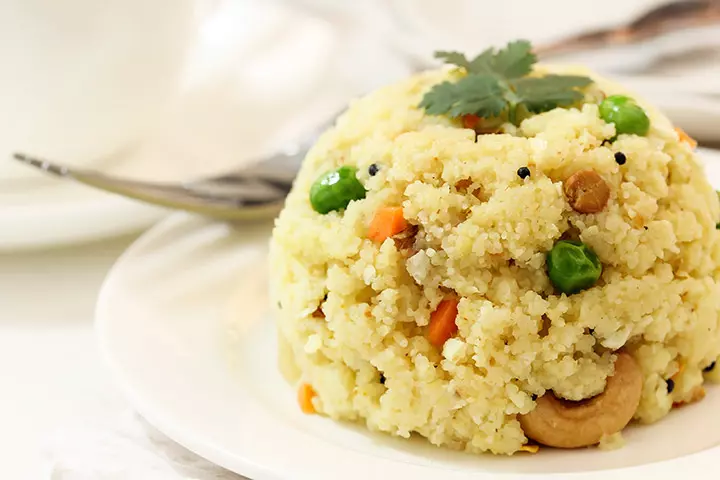
Preparation time: 15min
You will need:
- 1/2 cup semolina or suji
- 1/4tsp ghee
- 1 cup water
- pinch of turmeric
- pinch of salt
- 1/4 cup vegetables (chopped)
- 1/2tsp mustard seeds or cumin seeds
How to:
- Take a pan and dry-roast suji while stirring. Once done, keep aside.
- Pour ghee into a pan and add cumin or mustard seeds.
- Add veggies, turmeric, and salt. Saute and add suji.
- Add water while stirring, to avoid lumps.
- Switch off the flame once it comes to a desired consistency.
 Quick tip
Quick tipNote: Ensure your child is not allergic to nuts.
2. Sweet potato porridge
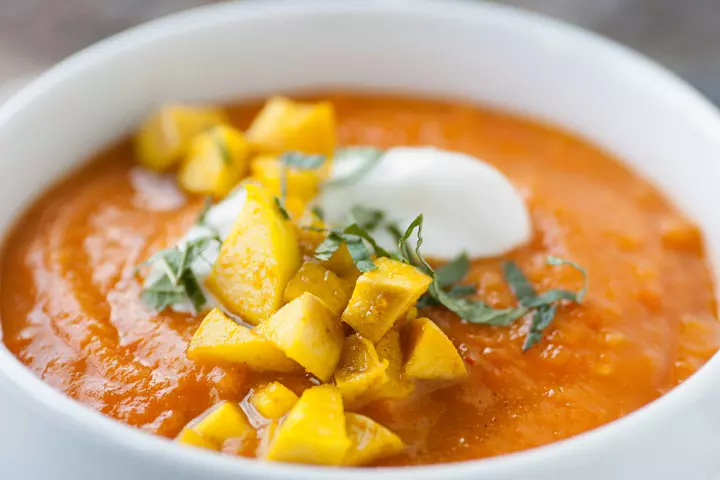
- 2 sweet potatoes (cut, boiled)
- 1tsp grated jaggery
- 1 cup milk/ almond milk
- 1/4tsp cinnamon powder
How to:
- Mash boiled sweet potatoes. Take off the thread-like fiber from the boiled sweet potatoes, if any.
- Heat milk in a separate pan and add the mashed sweet potato and cinnamon powder. Keep stirring, continuously.
- Add jaggery. Switch off the stove. Allow the porridge to cool down.
Meal Ideas
3. Vegetable khichdi
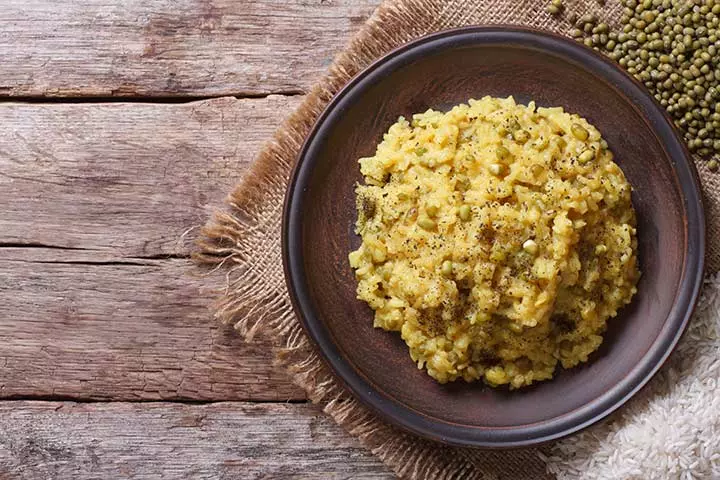
Preparation time: 15min
You will need:
- 1tbsp split green gram (moong dal, pre-soaked for an hour)
- pinch of turmeric
- 1/2 cup rice (pre-soaked for an hour)
- 1 cup water
How to:
- Add all the ingredients in a pressure cooker and cook for three whistles.
- Mash well and serve warm.
Snack Ideas
Wondering what snacks to give for your 8 month old baby? See the following healthy options:
4. Potato beans and pea puree (evening time)
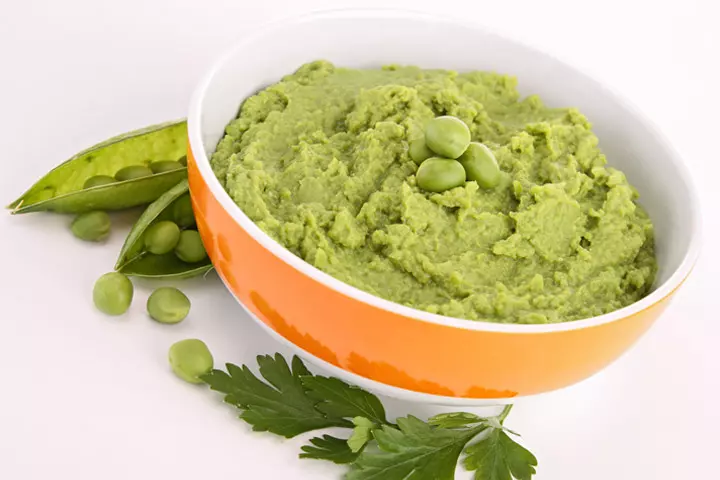
Preparation time: 45min
You will need:
- 1 sweet potato
- 3-4 cups water
- 1/4 cup rice
How to:
- Peel and dice sweet potato. Wash well.
- Transfer sweet potato pieces to a saucepan with water and rice. Bring it to boil.
- Cook for 40 minutes. Blend after cooking and serve warm.
Dinner Ideas
5. Carrot and apple soup with potatoes
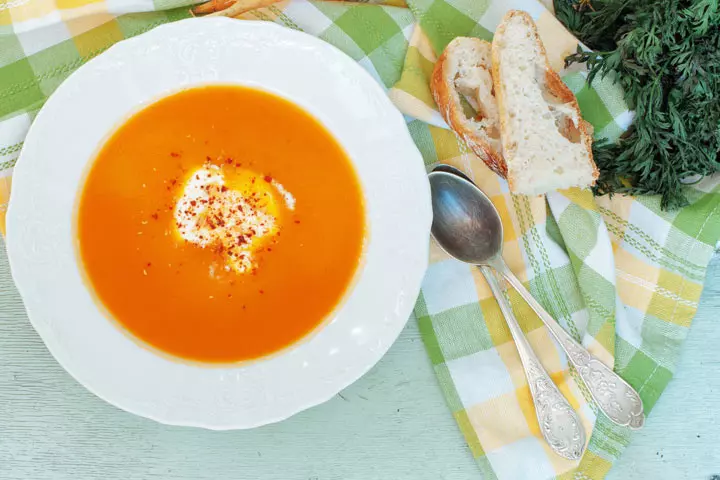
- 1/2 cup apples (chopped)
- 2 tbsp carrot (peeled, diced)
- 1/4 cup potatoes (chopped)
- 1 tsp oil
- 1 tbsp onions (finely chopped)
- 1 cup water
How to:
- Pour oil in a pressure cooker, add onions and saute for half a minute.
- Add the remaining ingredients and cook for three whistles.
- After it is cooked, blend well and serve lukewarm.
8 Feeding Tips For Your Eight-Month-Old
Feeding an 8-month-old could be tiring. But, these tips will help in making the mealtime a joy for you and your little one.
- Feed small portions of food through the day.
- Do not feed more than half cup of food each time.
- Do not introduce new foods more than once at a time. After making sure that the baby is not allergic or non-reactive to a new food, go for another new one. This would help you identify your baby’s food allergies.
- Say no to processed or commercial baby foods, which tend to hamper the baby’s development.
- Interact with your baby as much as possible during meal time.
- Pick foods that boost gray cells of the brain and offer energy.
- Avoid sugar or salt in homemade recipes.
- Be patient. Do not worry even if your little one is a fussy eater.
Additionally, make sure to give small sips of water to the baby during meals to keep them hydrated and help them digest the food.
 Quick tip
Quick tipFrequently Asked Questions
1. Can an 8-month-old baby eat eggs?
Yes. According to the current 2015–2020 Dietary Guidelines for Americans, eggs should be included in infants’ diets. Studies have shown a significantly increased choline and DHA intake in babies aged 6-9 months who were fed eggs (3). However, because eggs are potentially allergenic food, if you’re introducing them into your baby’s diet for the first time, wait for 3-5 days to see if any allergic responses occur.
2. How to cut food for an 8-month-old baby?
You may introduce thicker and lumpier meals to your baby’s diet at eight months, along with mashed, pureed, or strained foods with a smooth texture. To avoid choking on certain foods, cut soft foods and small spherical foods, such as grapes, cherries, and tomatoes, into small pieces or thin slices, while cylindrical foods, such as sausage and string cheese, should be cut into small thin strips rather than round pieces (4).
3. How do I give spaghetti to my 8-month-old baby?
Spaghetti is a type of pasta. Make sure it is well-cooked and moist so you can mash it as desired. If your infant has wheat/gluten sensitivityiAllergic reactions to certain foods , avoid or gradually introduce spaghetti into their diet.
4. How much infant formula can you feed an 8-month-old baby?
After six months of age, you can feed your baby an average of 90 to 120 ml of infant formula per kilogram of your baby’s body weight per day, divided into four or five feedings over 24 hours (5) (6).
5. How many times a day should an 8-month-old baby eat?
An 8-month-old baby should be fed half a cup of soft food two to three times a day (7).
6. How much water should an 8-month-old baby drink each day?
The suggested daily intake of water is 4-8 oz or 0.5-1 cup of water per day (8).
7. How much iron should an 8-month-old baby get from their solid foods?
An 8-month-old baby should get 11 milligrams of iron a day from their solid foods (9).
8. What are some common allergens to avoid when feeding an 8-month-old baby?
Some common allergens to avoid when feeding an 8-month-old baby include cow’s milk, wheat, eggs, peanuts, and fish. It is recommended to avoid these foods during the child’s first year of life to help prevent potential allergic reactions (10).
9. What should I do if my baby refuses to eat?
Keep calm and be patient. Sometimes, the baby might be too tired or distracted to eat or may not be hungry. So, look for hunger cues and offer a variety of colored food to pique their interest.
You can do various experiments with your 8-month baby food as they still develop their tastes and preferences. You also are yet to know about their possible allergies, and you will know only when you offer various foods. Including pulses, cereals, fruits, and vegetables in your baby’s diet after starting solids allows them to have a diversified taste profile and acquire the required nutrition. We have also included a few simple recipes to make your job easier.
Infographic: Practical Advice For Feeding An Eight-Month-Old Baby
Your baby is ready to explore new tastes and foods around the age of eight months, and offering a range of foods can help set the tone for a balanced diet. This infographic presents pointers and recommendations for feeding your eight-month-old infant correctly. Scroll on! Illustration: Momjunction Design Team
Illustration: 8th month baby food: Feeding schedule with Tasty Recipes
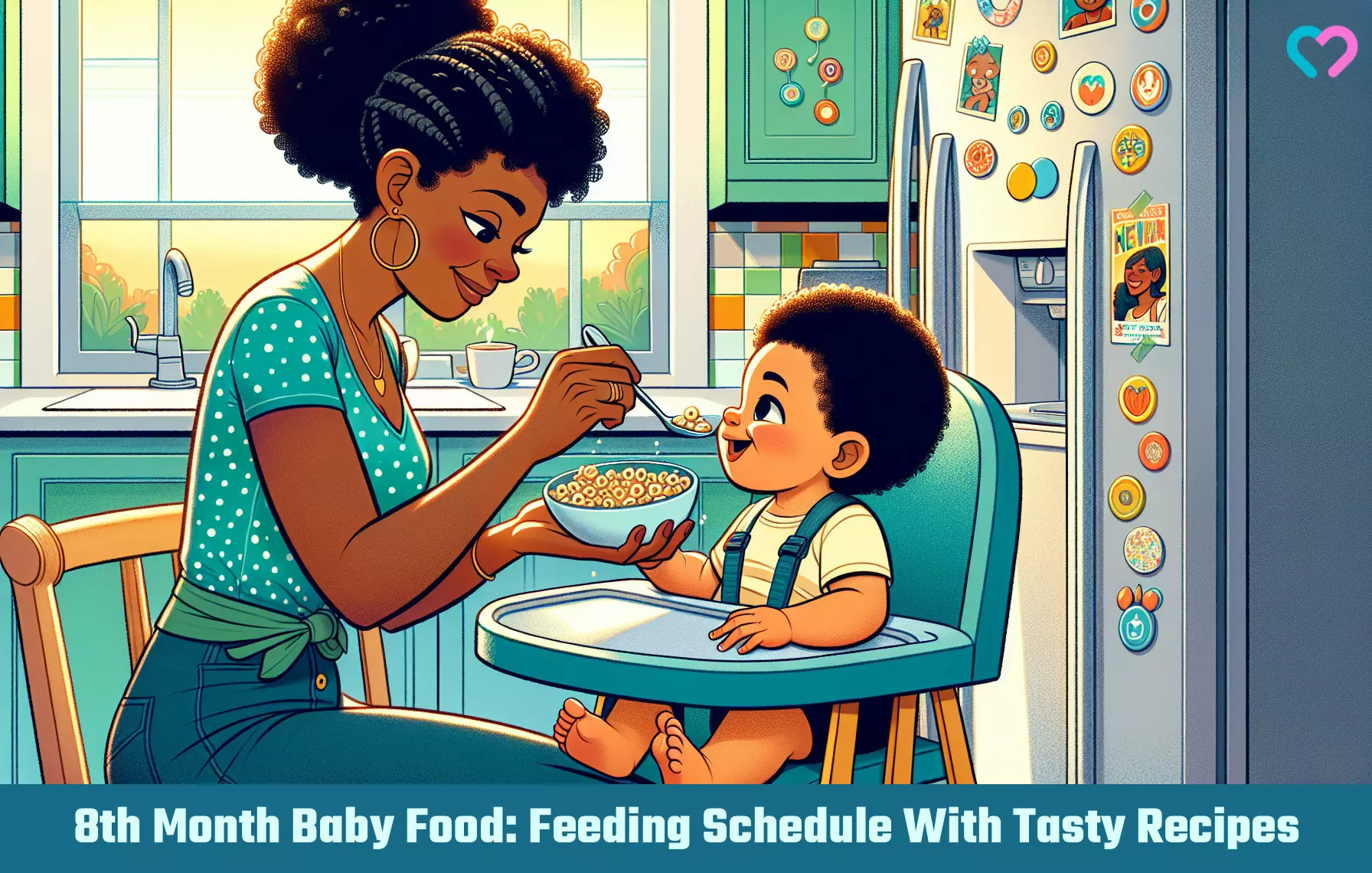
Image: Dall·E/MomJunction Design Team
Personal Experience: Source
MomJunction articles include first-hand experiences to provide you with better insights through real-life narratives. Here are the sources of personal accounts referenced in this article.
i. Breastfeeding — All the techniques and tricks I had to learn, and more.https://medium.com/@estelle.link.el/breastfeeding-all-the-techniques-and-tricks-i-had-to-learn-and-more-ad6d01af974b
References
- Care For Your Baby And Young Child.
https://www.healthvermont.gov/family/infants-young-children/care-your-baby-and-young-child - Foods to Avoid for Baby – Healthy Eating for Babies Age 6-12 Months.
https://www.gov.nl.ca/healthyeating/baby/offering-healthy-foods/foods-to-avoid-for-baby/ - Yanni Papanikolaou and Victor L. Fulgoni; (2018); Egg Consumption in Infants is Associated with Longer Recumbent Length and Greater Intake of Several Nutrients Essential in Growth and Development.
https://www.ncbi.nlm.nih.gov/pmc/articles/PMC6024369/ - When, What, and How to Introduce Solid Foods.
https://www.cdc.gov/infant-toddler-nutrition/foods-and-drinks/when-what-and-how-to-introduce-solid-foods.html?CDC_AAref_Val=https://www.cdc.gov/nutrition/infantandtoddlernutrition/foods-and-drinks/when-to-introduce-solid-foods.html - Amount and Schedule of Formula Feedings.
https://www.healthychildren.org/English/ages-stages/baby/formula-feeding/Pages/Amount-and-Schedule-of-Formula-Feedings.aspx - Bottle feeding – nutrition and safety.
https://www.betterhealth.vic.gov.au/health/healthyliving/bottle-feeding-nutrition-and-safety#amount-of-formula-required - Feeding your baby: 6–12 months
https://www.unicef.org/parenting/food-nutrition/feeding-your-baby-6-12-months - Recommended Drinks for Children Age 5 & Younger
https://www.healthychildren.org/English/healthy-living/nutrition/Pages/Recommended-Drinks-for-Young-Children-Ages-0-5.aspx - Iron (for Parents)
https://kidshealth.org/en/parents/iron.html - Food Allergies in Children
https://www.hopkinsmedicine.org/health/conditions-and-diseases/food-allergies-in-children - Food and Media: Not a Healthy Mix
https://www.healthychildren.org/English/family-life/Media/Pages/Food-and-TV-Not-a-Healthy-Mix.aspx
Community Experiences
Join the conversation and become a part of our nurturing community! Share your stories, experiences, and insights to connect with fellow parents.
Read full bio of Moloko Mehlape
Read full bio of Swati Patwal
Read full bio of Rohit Garoo
Read full bio of Vidya Tadapatri












